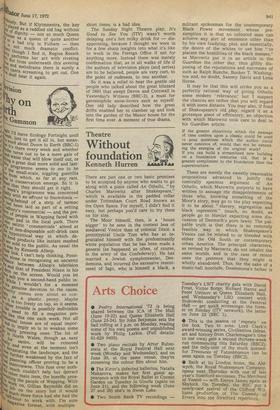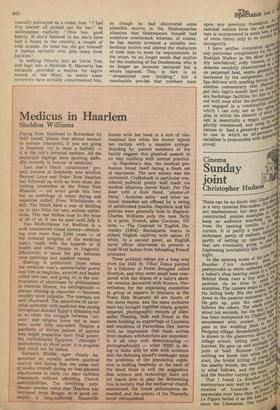Theatre
Without , foundation
Kenneth Hurren
There are just one or two basic premises to be accepted by anyone who wants to go along with a piece called An Othello, "by Charles Marowitz after Shakespeare," which is available in the padded cellar under Tottenham Court Road known as the Open Space. For myself, I didn't find it easy, but perhaps you'd care to try them on for size.
The Moor himself, then, is a house nigger' to be seen in the context less of mediaeval Venice than of colonial Dixie: a prototypical Uncle Tom who has so ingratiated himself with the predominantly white population that he has been made a general (as happened so often, of course, in the army of the Confederacy). He has married a Jewish nymphomaniac, Desdemona, and incurred the excessive resentment of Iago, who is himself a black, a militant spokesman for the contemporary Black Power movement whose presumption it is that no coloured man can achieve any sort of eminence other than by his own toadying; plus, and essentially, the desire of the whites to use him "to placate the hostilities of the black masses," as Marowitz put it in an article in the Guardian the other day, thus glibly disposing of the reputations and successes of such as Ralph Bunche, Booker T. Washington and, no doubt, Sammy Davis and Lena Horne.
It may be that this will strike you as a perfectly rational way of giving Othello some modern 'relevance,' but I suspect the chances are rather that you will regard it with some distaste. You may also, if fond of Shakespeare's old play, regard it as a grotesque piece of effrontery, an objection with which Marowitz took care to deal in his Guardian article: If the greater objectivity which the passage of time confers upon a classic could be used to pose questions which the author could never conceive of, would that not be extending the energies of the original work? .
If you can build a streamlined new building on a foundation centuries old, that is a greater compliment to the foundation than the superstructure.
These are merely the sweetly reasonable propositions advanced to justify the comically specious argument of An Othello, which Marowitz purports to have written to assuage the disappointments of those who, knowing something of the Moor's story, may go to the play expecting it to be about "slavery, segregation and black repression" (much, no doubt, as people go to Ham/et expecting some discussion of Denmark's porn laws). The palpable truth is that there is no remotely feasible way in which Shakespeare's Venice can be related to or blended with either the Old South or contemporary urban America. The principal characters, as revised by Marowitz, do not inhabit the same worlds, and in the case of minor ones the pretence that they might is wholly abandoned. Thus, for the sake of a music-hall interlude, Desdemona's father is casually portrayed as a comic Jew: "I had this lawyer all picked out for her," he soliloquises ruefully. "Nice boy, good family. If she'd listened to me she'd have had a house in the country, a couple of kids already. So what has she got instead? A jealous epileptic who gets crazy from hankies."
In making Othello into an Uncle Tom and Iago into a Malcolm X, Marowitz has certainly provided a motive for Iago's hatred of the Moor, on which some reviewers have actually complimented him, as though he had discovered some plausible motive in the Shakespearian situation that Shakespeare himself had somehow overlooked; whereas, of course, he has merely invented a suitably tendentious motive and altered the characters of both men to meet its requirements. In the event, he no longer needs that motive for the traducing of his Desdemona, who is no longer an innocent betrayed but a whore exposed. This, in fact, is no "streamlined new building," but a ramshackle pre-fab that nowhere rests











































 Previous page
Previous page